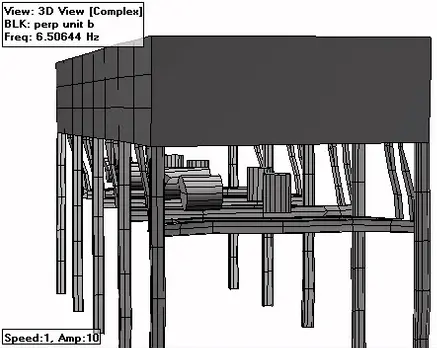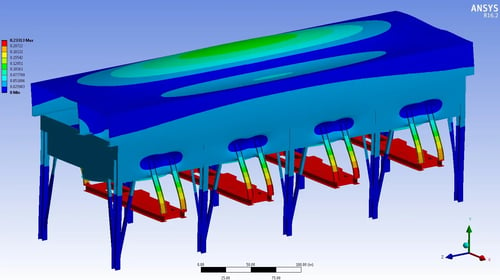Pre-Commission Analysis Of Fin Fan Oil Cooler At A Petroleum Refinery
Execution of an experimental modal analysis which revealed potential resonance issues on a fin fan oil cooler before commissioning at a petroleum refinery. A finite element analysis helped develop a fix before the unit was ever started.
- Problem Statement (Challenge)
- What (type of machine): Petroleum Refinery Fin Fan Oil Cooler Structure
- Where (State/ Country): Pennsylvania
- Why (problem/reason): Identify potential problematic modes near the relevant excitations for the cooler assembly before commissioning
- Work Performed
- Results/ Solution
- Findings: Group of modes were identified within 15% of the 1x and 2x fan running speed, represented a significant risk of resonance condition that could result in vibration related reliability issues.
- Impact: Finite Element results indicated that adding cross bracing as shown resulted in separation margins greater than 15% separation. The proposed modification provides a practical level of protection relative to vibration related reliability issues due to a resonance condition.
Baseline FEA calibrated to match field data.
Yellow struts were modifications implemented before commissioning to eliminate resonance.
REAL-WORLD EXAMPLES AND CASE STUDIES
MSI In Action
Case Study
Troubleshooting a Pipeline Renewable Diesel Screw Pump
Elevated vibration levels were causing a pipeline company screw pump problems.
Case Study
Petrochemical Ammonia Recip Compressor Piping Troubleshooting
Excessive motion by the discharge piping of a petrochemical ammonia reciprocating compressor startled the operators.
Case Study
Oil Tanker Pumping Station Screw Pump Troubleshooting
Troubleshooting a new oil tanker pumping station in Colombia consisting of 4 screw pumps. Specialized testing revealed that piping natural frequencies were to blame.


